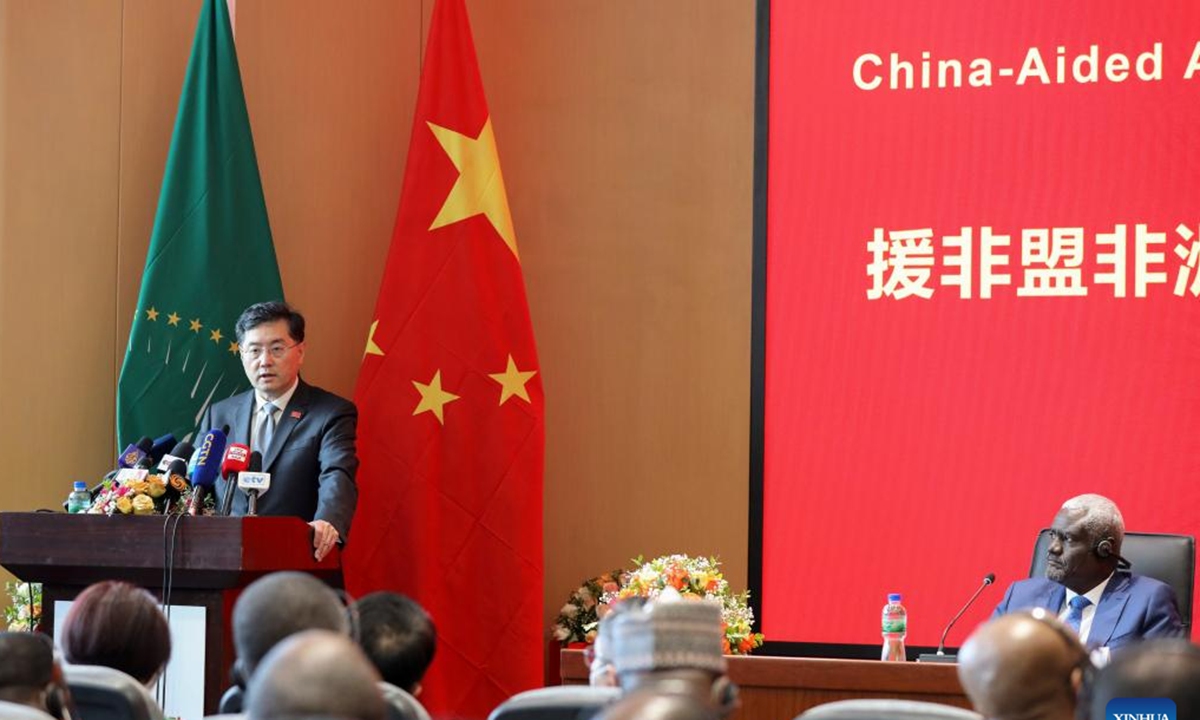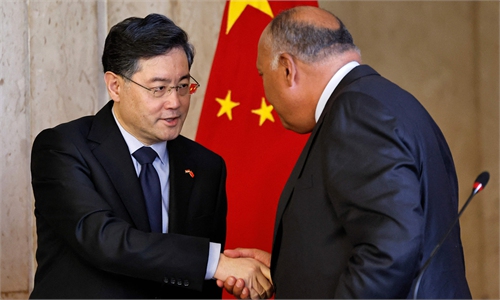The US’ fox tail is exposed in its diplomacy toward Africa: Global Times editorial

Chinese Foreign Minister Qin Gang makes remarks in a joint press conference with the Chairperson of the African Union (AU) Commission Moussa Faki Mahamat in Addis Ababa, the capital of Ethiopia, on Jan. 11, 2023. Photo: Xinhua
Just after Chinese Foreign Minister Qin Gang concluded his visit to Africa on Monday, US Treasury Secretary Janet Yellen will visit three African countries this week. It has been the 33rd consecutive year in which Africa has been the destination of Chinese foreign ministers' annual first overseas visits, but the US does not have a similar tradition. Before Yellen's trip, the US media actively compared Qin's visit with that of Yellen, setting the tone for her travel, saying this visit is crucial to "counter China's influence across the developing world." This has once again confirmed the outside world's impression of US diplomacy, that is, it has almost degenerated into chewing gum stuck on the sole of China's diplomatic shoes.This year will be a year of intensive US diplomatic activities in Africa. After Yellen, President Joe Biden and many other senior US officials including Vice President Kamala Harris, Trade Representative Katherine Tai, and Secretary of Commerce Gina M. Raimondo, will go to Africa. US officials will come and go, on the surface, it seems that Africa has received unprecedented attention. But in reality, from the perspective of Washington's deep-rooted game of major powers, Africa's status as a strategic tool has become more prominent. It is an obvious fact that the motives behind this round of upsurge in US diplomacy toward Africa this year are not pure. And when reporting on the diplomatic activities of the US in Africa and other regions, it is inevitable for media outlets to always mention that they are aimed at "countering China's influence." This has basically become fixed.
A month ago, the US hosted the US-Africa Leaders Summit in Washington, inviting more than 40 African leaders, and made some promises at the meeting. It's well-known that the US-Africa Leaders Summit is an imitation of the Forum on China-Africa Cooperation (FOCAC) after the US saw the FOCAC's success. Although the Biden administration has repeatedly stated that the US doesn't aim to compete with other countries in Africa and avoided talking about "confronting China," in practice it does not change its mentality of zero-sum game, and always takes discrediting, restricting and suppressing China as its starting point. This is equivalent to the fox tail that the US exposes in its diplomacy toward Africa. It doesn't even bother to hide it. This is not a good look, which not only displays malice toward China, but also shows a great disrespect for African countries.
As Washington's first major activity to "boost US-Africa relations" after the US-Africa Leaders Summit, a US Treasury official told media that Yellen's visit is intended to offer sustainable, high-quality investments, and that China's debt issues would be a key topic. A senior US official also said Washington intends to offer African leaders more sustainable choices than China. In other words, the importance of Africa does not entirely depend on Africa's own economic and development potential, but depends more on how strong the "China threat" or "Chinese influence" is in US' view. Under this perspective, it is hard to say what the US will do for the development of Africa with sincerity.
Yellen will visit three countries this time. Senegal now holds the rotating presidency of the African Union while South Africa is one of the most powerful countries in Africa. It's not difficult to understand such an arrangement. Washington harbors a dark intention to visit Zambia. Zambia's serious debt problem lets Washington see an opportunity to sow discord. Western officials, including Yellen, once "severely criticized China" on Zambia's debt issue. They turned a blind eye to China's efforts and achievements in coordinating and alleviating the debt pressure of Zambia and other African countries, which is purely deliberate faultfinding.
Chinese Foreign Minister Qin Gang specifically responded to this during his visit to Africa, saying that China has always been committed to helping Africa alleviate debt pressure, actively participated in the G20 Debt Service Suspension Initiative (DSSI), and signed debt suspension agreements or reached debt suspension consensus with 19 African countries. China is the country that implements the largest amount of debt suspension among the members of the G20.
China has also actively participated in dealing with debts of Chad, Ethiopia and Zambia under the G20 Common Framework for Debt Treatments beyond the DSSI. Compared with China's responsible attitude, we can almost affirm that Yellen will most likely not give any constructive advice on Zambia's debt issue during her visit to the country, or provide real money to help Zambia, but will alienate China-Zambia relations by throwing out the set of clichés that slander China. Of course we hope that we have misunderstood Yellen and the US.
The African continent has plenty of development opportunities and great potential, but there are also many difficulties and problems. If the US really wants to help African countries, is it hard to find proper places and timing? Is it necessary to chase and follow China? Under the guise of helping Africa, the US actually regards the continent as a battleground for great powers. The African people have scales of justice in their mind, so Washington should stop disparaging their understanding, judgment and autonomy.


